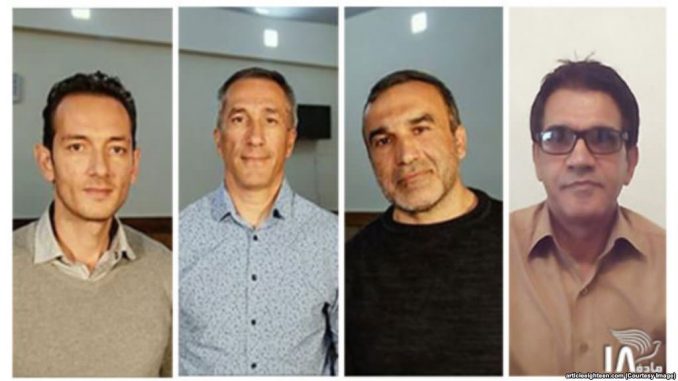
Three Azeri men and one Iranian man, all Protestant Christian converts, have been sentenced to 10 years in prison by the Revolutionary Court in Iran, according to Mansour Borji, the advocacy director of Article 18, an organisation that defends Christians in Iran.
No evidence was presented by the prosecution during the trial to show the defendants had acted against national security, Borji told the Center for Human Rights in Iran (CHRI).
He added that Judge Mashallah Ahmadzadeh of Branch 26 of the Revolutionary Court—who has issued sentences ranging from five to 15 years in prison to 16 Christian converts since April 2017—referenced a report by the Islamic Revolutionary Guard Corps (IRGC) during the trial.
The report was not included as evidence in the case files, Borji said, so the defense was unable to respond to its content.
Yusif Farhadov, Eldar Gurbanov and Bahram Nasibov from Baku in the Republic of Azerbaijan, and Iranian national Nasser Navard Goltapeh were arrested by security forces on June 24, 2016 at a reception hosted by their Christian friends in Andisheh, a suburb of Karaj, west of Tehran, according to Borji.
“The three Azeri Christian converts returned to Baku after being freed on bail, but Nasser is in Iran and he’s worried about the outcome of the appeal,” he added.
The four were accused of being “Zionist Christians” who “acted against national security with the intention of overthrowing the state in a soft war” and were all sentenced to 10 years in prison based on Article 498 of Iran’s Islamic Penal Code by Judge Ahmadzadeh.
Article 498 states: “Anyone, with any ideology, who establishes or directs a group, society, or branch, inside or outside the country, with any name or title, that constitutes more than two individuals and aims to perturb the security of the country… shall be sentenced to two to 10 years imprisonment.”
Christian converts in Iran are routinely subjected to arbitrary arrests and prosecuted on vague national security related charges in trials lacking due process and with evidentiary standards well below international standards.
“During questioning and the trial, the accused repeatedly said they had not done anything wrong,” Borji told CHRI. “They only prayed and carried out Christian rituals at home-based churches [in their daily lives].”
source: iranhumanrights.org
Leave a Reply